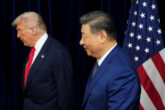May 30, 2023
China Is Flirting With AI Catastrophe
Few early observers of the Cold War could have imagined that the worst nuclear catastrophe of the era would occur at an obscure power facility in Ukraine. The 1986 Chernobyl disaster was the result of a flawed nuclear reactor design and a series of mistakes made by the plant operators. The fact that the world’s superpowers were spiraling into an arms race of potentially world-ending magnitude tended to eclipse the less obvious dangers of what was, at the time, an experimental new technology. And yet despite hair-raising episodes such as the Cuban missile crisis of 1962, it was a failure of simple safety measures, exacerbated by authoritarian crisis bungling, that resulted in the uncontrolled release of 400 times the radiation emitted by the U.S. nuclear bomb dropped on Hiroshima in 1945. Estimates of the devastation from Chernobyl range from hundreds to tens of thousands of premature deaths from radiation—not to mention an “exclusion zone” that is twice the size of London and remains largely abandoned to this day.
Today’s AI sprint would not be the first time Beijing’s desire to hasten progress invited disaster.
As the world settles into a new era of rivalry—this time between China and the United States—competition over another revolutionary technology, artificial intelligence, has sparked a flurry of military and ethical concerns parallel to those initiated by the nuclear race. Those concerns are well worth the attention they are receiving, and more: a world of autonomous weapons and machine-speed war could have devastating consequences for humanity. Beijing’s use of AI tools to help fuel its crimes against humanity against the Uyghur people in Xinjiang already amounts to a catastrophe.
Read the full article from Foreign Affairs.
More from CNAS
-
Transatlantic Security / Technology & National Security
Look Before We Leap on Artificial IntelligenceThis article was originally published on The Dispatch. A debate about the role that artificial intelligence should and will play in society, and how it will affect humanity fo...
By Jon B. Wolfsthal
-
Technology & National Security
Caleb Withers on the Cybersecurity Frontier in the Age of AICaleb Withers, research associate at the Center for a New American Security, joins Kevin Frazier, the AI Innovation and Law Fellow at the University of Texas School of Law and...
By Caleb Withers
-
Technology & National Security
Prepared, Not ParalyzedExecutive Summary The Trump administration has embraced a pro-innovation approach to artificial intelligence (AI) policy. Its AI Action Plan, released July 2025, underscores t...
By Janet Egan, Spencer Michaels & Caleb Withers
-
Indo-Pacific Security / Technology & National Security
Sharper: Tech + ChinaRecent talks between President Donald Trump and Chinese Communist Party General Secretary Xi Jinping placed a spotlight on emerging technologies, from high-end chips to minera...
By Charles Horn & Sevi Silvia




